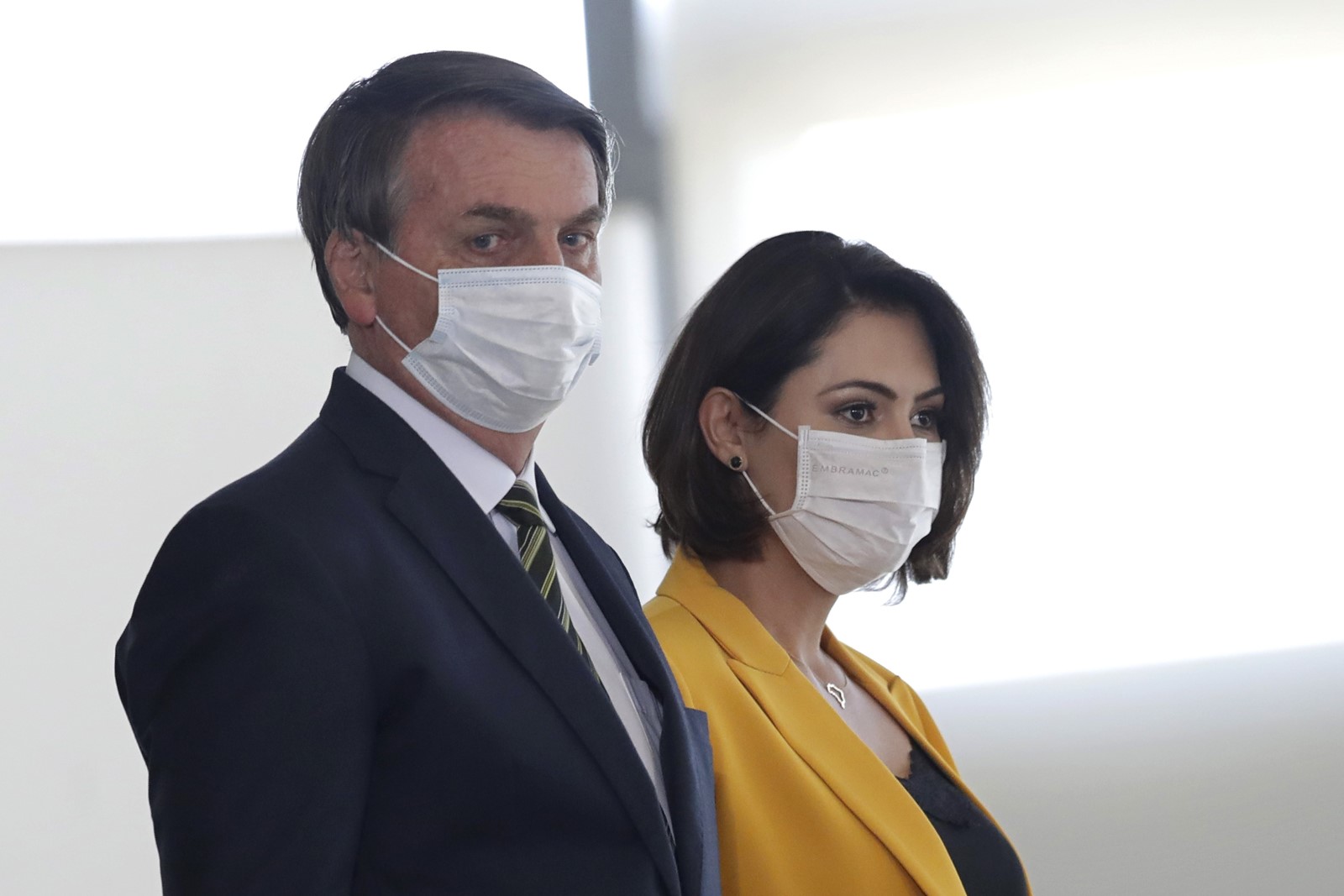Probe pressuring Brazil’s Bolsonaro
Investigation into graft ensnares wife and son of president

The response was aggressive, even for a president known for venting his anger at journalists and critics.
“What I’d like to do,” Bolsonaro told the reporter, “is smash your mouth in.”
In his two years in office, as Bolsonaro and his inner circle, including his sons, have become engulfed in a growing number of criminal and legislative investigations, he has lashed out at reporters, investigators and even members of his own Cabinet who have dared go against him.
But the case involving the former aide and family confidant — which revolves around the potential theft of public sector wages — has particularly rattled Bolsonaro’s nerves by putting his wife and his oldest son at the center of a corruption investigation that has developed into one of his biggest personal and political liabilities.
The expanding set of inquiries into the president and his family are testing the independence and strength of the justice system in one of the world’s largest democracies, with the largest economy in the Southern Hemisphere.
Just a few years ago, Brazil’s judiciary earned global accolades for taking down powerful officials and business titans in an anti-corruption crusade that upended the political establishment.
Now Bolsonaro, whose rise from the fringes of far-right politics to the presidency was largely propelled by a promise to root out graft and crime, stands accused of undermining the rule of law, as the scandals inch ever closer to the presidential palace.
Experts say the evidence that has come to light so far in the case of the former aide, Fabrício Queiroz, suggests the Bolsonaro family partook in a scheme known as
“The suspicion is that this was a family business that lasted many years and moved a lot of money,” Bruno Brandão, executive director of Transparency International in Brazil, said of the graft scheme involving the former aide. “These suppositions are very serious, corroborated by solid evidence, in an investigation that is based on highly irregular financial transactions.”
In court filings and leaks to the press, authorities have outlined their suspicion that starting in 2007, Queiroz helped the president’s oldest son, Flavio Bolsonaro, steal public funds by pocketing part of the wages of people on his payroll when he was a state representative. Flavio Bolsonaro was elected to the Senate in 2018.
Between 2011 and 2016, Queiroz funneled thousands of dollars to the president’s wife, Michelle Bolsonaro, in transactions neither of them can explain. Prosecutors also believe deposits made to the president’s son might be connected to the scheme.
Drawing on a vast dossier of financial records, investigators are trying to determine whether the irregular cash flow at a chocolate shop Flavio Bolsonaro bought in 2015, and a series of real estate purchases he made in cash, amount to money laundering.
Separately, a Brazilian newspaper uncovered that one of Queiroz’s daughters, Nathalia Queiroz, was on the payroll of the president’s former congressional office in Brasilia between 2016 and 2018, even though she was working as a personal trainer in Rio de Janeiro at the time.
Bank records obtained by prosecutors show that Queiroz made monthly payments to her father that totaled tens of thousands of dollars between 2017 and 2018.
The president’s office declined to comment on the case on behalf of Jair Bolsonaro and his wife. Michelle Bolsonaro met her husband in 2006 while she was working as a secretary in Congress. After the two began dating, she joined his legislative staff, a move that tripled her salary.
Paulo Emílio Catta Preta, a lawyer representing Queiroz, said the transactions involving the Bolsonaro family “have absolutely nothing to do with alleged misappropriation of funds.” Flavio Bolsonaro’s attorney did not respond to a request for interviews.
Another of the president’s sons, Carlos Bolsonaro, is being investigated on similar charges of diverting public funds during his time as a City Council member in Rio de Janeiro and in connection with a case about disinformation campaigns waged online. A third son, Eduardo Bolsonaro, is also involved in the disinformation case.
Those actions contributed to the dramatic exit of Jair Bolsonaro’s most popular Cabinet member, Sergio Moro, who in April accused the president of seeking to replace the head of the federal police in order to shield friends and relatives from criminal investigations.
Investigators are struggling to make headway. The fight against corruption, which once sparked mass protests, has lost resonance as Brazil faces the world’s second-highest number of deaths from the coronavirus,and the ensuing economic meltdown.
Just how politically damaging the case will be for Bolsonaro in the long run is unclear, analysts say. Despite his cavalier handling of the coronavirus pandemic, which has contributed to the death of over 120,000 Brazilians — second in the world only behind the United States — the president has broadened his support base slightly by giving emergency aid to millions of Brazilians.
“The majority of Brazilians are thinking a lot more about survival than political matters,” said Mauro Paulino, director of the Datafolha polling firm. “When survival is your primary concern, corruption becomes a secondary issue.”


 PREVIOUS ARTICLE
PREVIOUS ARTICLE
